Attached dossier
Solntsevskaya group consul
Cooperation between Solntsevskaya group and Mogilevich began in the 1980s and is still in place as it is beneficial to both parties. All this time Mikhas and his team have provided physical protection for Semen, without which he would be dead by now. In his turn, Mogilevich is a financial consultant to Mikhas. It is largely thanks to his efforts that Solntsevskaya group leader virtually legalized his business and is now a successful businessman. Semen Mogilevich was equally helpful to Sergey Mikhailov in his attempts to settle abroad.
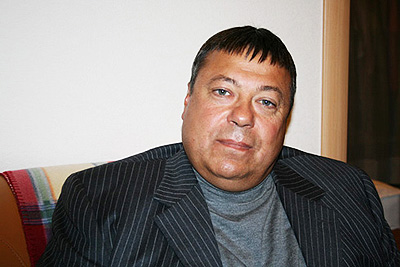
Sergey Mikhailov a.k.a. Mikhas
In 1993 Solntsevskaya group had a conflict with a number of Caucasian groups, especially in Chechnya. Mikhas decided to leave Russia. Mogilevich immediately invited him to come to Hungary, where Mogilevich and Igor Fisherman provided everything necessary for him. But Mikhas did not like it there for some reason and he decided to move to Israel. In Budapest Seva Kievsky arranged a marriage of Solntsevskaya group leader with a Jew (for that he had to divorce his wife Lyudmila for some time), which took place in June 1993. Under protection of Mogilevich, Mikhas left from Budapest to Austria which at the time was one of the main centres of Jewish emigration. Then he arrived in Tel Aviv as an immigrant. There he presented documents under which he was deputy director of Maganex Vallakozot.
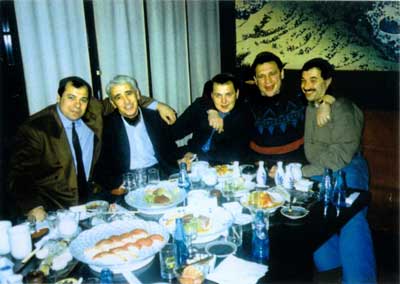
From lesf to right: Mikhas, Jamal Khachidze, Arnold Tamm, Viktor Averin, Korotai(?)
At some point of time Mikhas was put on the Israeli Interior Ministry list of persons subject to limitations in the issuance of an Israeli passport. However, Mogilevich and his friend Shabtai Kalmanovich helped play around the ban. Soon Mikhas had his Israeli ID.
But he quickly got bored in Israel. In 1994 Mikhailov, Mogilevich, and Kalmanovich flew to Costa Rica. Mikhas came back in a different status. For a toll of 350 thousand dollars his friends helped him obtain the post of Honourary Consul of Costa Rica in Moscow. This post provided for a diplomatic passport, which makes it much easier to travel around the world. The story concerning the position for Mikhas caused a big scandal in Costa Rica. In 1995 the Costa Rican government dismissed about 100 diplomats for taking bribes in the appointment of honourary consuls.
In late 1994 and early 1995 Mikhas and Mogilevich made several trips to Miami, where, it seems, Solntsevskaya group leader planned to settle down. But then the partners had an argument. Getting used abroad, Mikhailov began to realize that his financial assistant often took money for personal use from Solntsevskaya group support fund. According to Interpol, the leader of Solntsevskaya group demanded Mogilevich to pay 15 million dollars, but he refused. Then Mikhas started to threaten Seva Kievsky over the phone. Their talks were recorded by intelligence agencies of several countries in Europe.
The parties have agreed to resolve the conflict on a large-scale gathering, which would bring together all the leaders of criminal business organized by Mogilevich. In February 1995 more than 70 gangsters met in Prague. Among those who visited centre U Holubu there was Mogilevich, Aleksandrov, Katrich, Hayes, Sergey Mikhailov, the brothers Victor and Aleksander Averin, Arnold Tamm, Leonid Bilunov, Igor Dashdamirov (one of the Solntsevskaya group kingpins suspected of the murder of journalist Vladislav Listyev), Dzhemal Khachidze, Yevgeny Lyustranov and others. Mikhas required to return 15 million dollars and said that Mogilevich could easily be replaced in the criminal and financial schemes with some other person. But the issue was not resolved at the meeting, and the assembled took up discussing other pressing issues, namely the development of legal and illegal businesses.
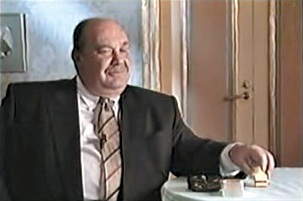
The parties agreed to discuss the topic of debt once again on a new gathering, scheduled for May 1995. Meanwhile, security forces continued to wiretap Russian kingpins and found out that Solntsevskaya group was planning to eliminate Seva Kievsky immediately following the May gathering. Apparently, Semen Mogilevich also found that out. On June 1, 1995 when the mob again gathered in Prague in U Holubu, Mogilevich urgently flew from the Czech Republic to Hungary. It was Katrich, Hayesm and Aleksandrov who represented his interests at the gathering. However, the gathering did not go well. The police broke into the entertainment complex and detained about 100 Mafiosi. Czech authorities denied all of them, including Mogilevich, entry to the country for ten years.
By this time, European intelligence agencies closely watched the criminal empire, built by Seva Kievsky. In May 1995 Galina Grigoryeva and Andrey Cherchvald were put in custody in London on charges of money laundering. At the same time Arigon Ltd. accounts were arrested with 80 million dollars on them.
British police issued a warrant for the arrest of Mogilevich. It was only in 1997 that his lawyers managed to overturn the order, but the UK banned Semen Mpgilevich from entering the country for life. He also became persona non grata in Slovakia. Then in some other countries.
At that point of time Mikhailov and Mogilevich realized that their financial interests were at risk, and quickly found a common language. Seva Kievsky agreed to pay the leader of Solntsevskaya group 5 million dollars, on which the conflict was settled. In October 1995 Mikhailov, Viktor Averin, Semen Mogilevich and several businessmen from Ukraine, including Vadim Rabinovich and Boris Birshtein, met at the Hilton Hotel in Tel Aviv. They discussed plans for the future. They make a decision to develop the Ukrainian direction, where Seva Kievsky’s confidents had good connections.
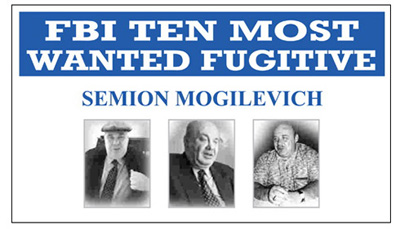
It never rains but it pours. In 1996 Mikhas went to Switzerland, where he was arrested on the case materials sent from Russia. He was accused of money laundering and involvement in organized crime. Mogilevich tried to rescue his business partner. In Solntsevskaya group the relevant work oversees was performed by Arnold Tamm, for whom Seva Kievsky created all conditions in Europe. The rescuers had one of the offices of Mogilevich in Budapest as their headquarters. As a result, the problem was solved.
Anatoly Katrich, the closest associate of Mogilevich, found a way to use Philip Rosenberg, an influential member of the Swiss Parliament. Katrich undertook funding of the election campaign of the deputy and paid him two million Belgian francs. The criminals asked the deputy for a return favour, namely to help free Mikhas from prison. Rosenberg began an active campaign and soon achieved a drastic change in public opinion in Switzerland, and, most importantly, the in the opinion of the authorities. Mikhas turned from a crime boss into a decent businessman, the victim of machinations of corrupt Russian security services. As a result, the leader of Solntsevskaya group was acquitted and released.
It should be noted that Mikhas came to Switzerland by no accident. He had an important meeting concerning a new project of Mogilevich with Solntsevskaya group, namely their participation in the supply of gas.
Seva Kievsky as gas monopolist
The documents of Interpol and the Russian Ministry of the Interior show how exactly Seva Kievsky got involved in the gas business. Back in the early 1990s police in Hungary recorded that Mogilevich’s men somehow acquired Gazprom securities. They used the securities in their schemes.
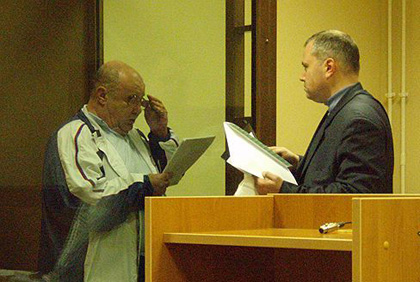
The securities were placed in the bank as a deposit. On this basis, criminals took out loans. Money went to develop profitable criminal business, and then the shares were bought back. Russian law enforcers managed to find out from where representatives of Seva Kievsky got the securities. At the time Mogilevich and Mikhas established relationships with Vyacheslav Kuznetsov, former employee of Ministry of the Interior, who served as adviser to Rem Vyakhirev, the then head of Gazprom. It was Kuznetsov who helped the gangsters get and use the shares.
However, their cooperation went further. According to Interpol, in 1996 there as a gathering in Switzerland. It was attended by Mogilevich, Mikhailov, Kuznetsov, Birstein and several others. The men developed supply chain of Russian and Turkmen natural gas to Ukraine. In Moscow the developed plan was supported by Vyakhirev and his friend Viktor Chernomyrdin, the then head of government. In Kiev Prime Minister Pavlo Lazarenko showed understanding. It was fairly easy to convince him as Igor Fisherman, right hand of Mogilevich, was his adviser.
The scheme, without going into technical details, was as follows: gas from Russia and Turkmenistan (in Turkmenistan it was bought by both Mogilevich’s entities and Gazprom) went to a transit company, controlled by Seva Kievsky and other interested parties. There it was mixed, and then later sent to Ukraine. Part of payments between the two countries was also made through transit companies. The emergence of such intermediaries could be explained simple: if Russia and Ukraine were to work directly, it would be difficult to steal budget money, but when there was a transit firm, there were fewer problems. Especially since their activities were controlled by Mogilevich, who knew all the nuances of financial institutions in the West and knew how to launder the stolen money and what to invest it in profitably.
RosUkrEnergo became the major transit company. A total of 50% of its shares belong to Gazprom and the other half was officially owned by Ukrainian businessmen Dmitry Firtash and Ivan Fursin. Both men were closely associated with Mogilevich. For instance, in 2000 Firtash owned an offshore company Highrock Holdings, which was established by Olga Schneider, the then wife of Seva Kievsky. Before Firtash was the official representative of Eural Trans Gas in Turkmenistan, Uzbekistan, and Kazakhstan. Eural Trans Gas was established in Hungary and was completely controlled by Mogilevich. The company also was one of the gas transit entities, working mainly with Turkmenistan.
As a result, the scheme elaborated by Gazprom, Mogilevich and corrupt officials of the two governments worked successfully. Gas money flowed. Part of it Seva Kievsky divided between the parties concerned. Heads of Gazprom and state gas companies of Ukraine changed so as heads of the two governments. Entities controlled by Mogilevich continued to operate the transit and everyone was satisfied. Nothing changed even after Mogilevich become an outcast around the world.
In 1998 the U.S. intelligence services launched an investigation in respect of Semen Mogilevich, Yaakov Bogatin, Igor Fisherman, and Anatoly Tsura on suspicion of violating 46 articles of the American Criminal Code, including cheating investors. The claims concerned the fact that in 1995 Mogilevich set up a company YBM Magnetix International Inc. based on the Canadian Pratex Technology Inc. By the time Pratex was already out on the Alberta Stock Exchange with its shares. They cost 10 Canadian cents a share. YBM at once announced that it was the successor to Pratex, only a more serious entity engaged in investments in magnets trade around the world, in oil refining, and the development of security systems for computers. Reports indicated that YBM profits were growing by leaps and bounds. It was enough for investors. They began buying shares of Mogilevich’s firm, the price of which rose steadily.
At first, YBM entered the U.S. stock exchange through brokerage firms, and then it became its direct participant. By 1998, YBM share price skyrocketed from 10 cents to 18.25 Canadian dollars, and 44 million shares were on the market. All this time investors regularly received their interest.

On May 13, 1998 four U.S. intelligence agencies including the FBI, the Internal Revenue Service, Customs Service, Immigration and Naturalization Service carried out a search and seizure of documents in the Pennsylvania office of YBM. It was announced that YBM was part of a scheme for money laundering. In September 1998 a fine of 3 million dollars was imposed on the company. It was paid, but on May 31, 1999 a criminal case was instituted against the previous management of YBM. The investigation took several years and ended in late February 2003. Then it was decided to indict the four YBM managers including Mogilevich, Bogatin, Fisherman, and Tsura.
According to the investigators, YBM reports intentionally overstated the actual number of deals and contract sums. Consequently, the company's market capitalization was artificially increased. Initially, it was clear that it was impossible to make a profit of 200% per annum by investing money in the trade of magnets and petroleum refining. Such funds could earn money only by money laundering and through other criminal activities. In fact, no one lied to investors. They bought shares in a giant "laundry" and received revenue from its activities. Officially, the profits were stated as resulting from the deals with magnets.
Moreover, the money went also to U.S. policymakers. At one time, Bogatin transferred a large amount to Republican fund for Congress elections.
In 2003 only Bogatin was in the United States and he was the only one arrested. Mogilevich, Fisherman, and Tsura were put on the international wanted list and the information on them is still on the website of Interpol. In the late 1990s Seva Kievsky lived in Hungary, but then he had to leave. When the U.S. launched the investigation in respect of the YBM founders, the FBI asked Budapest for assistance concerning Mogilevich. He was warned about that and he realized that he could be arrested on request of the United States. Thus, Mogilevich transferred his money from the Hungarian National Savings Bank to other accounts and moved to Moscow. He did it on time as already in October 1999 his arrest was under discussion in Hungary. However, local authorities limited their actions to only a ban for him to enter the country on the grounds of being a person who "represents a threat to public safety."
Initially, Mogilevich and Solntsevskaya group members did not leave hopes to solve their problems in Europe. In 1999 Anatoly Katrich tried to negotiate with the authorities of the Czech Republic to lift the ban on entry of Seva Kievsky, Mikhas and their partners. A year later Mogilevich, Mikhailov and Averin sent Petr Gorbatykh to Europe o bribe officials in the Czech Republic and Hungary, so that they have removed the names of the gangsters from the database of those prohibited to enter the countries. But all these attempts were unsuccessful. Gangsters continued to be under the supervision of the western secret services which monitored all their actions.
After an international arrest warrant was issued for Mogilevich in 2003, he officially coming to the West was out of question completely. But Semen did not give up. He began to change wives, take their name, changed his name and patronymic and even the date of birth even. By the time of his arrest in 2008 Seva Kievsky was already called Sergey Schneider and had the appropriate passport. However, his movement was still limited to the CIS.
Criminal kingpin let down by phone
In 2007 the authorities of Ukraine and Russia faced a long-emerging question: why, in fact, was there a need for Mogilevich as mediator in gas deals? Who, moreover, long ceased to have any serious impact on financial flows in the West. It was easy to deprive Seva Kievsky of his share in RosUkrEnergo as half of the company was owned by Gazprom and Firtash claimed he was not familiar with Seva Kievsky. But taking Eural Trans Gas from Mogilevich proved to be a challenge.
The company was concerned with trading natural gas which it bough from major Central Asian suppliers. Mogilevich had full control of the company and did not want to lose this valuable asset. When attempts to settle conflict failed, home security services intervened. It was impossible to bring Mogilevich to justice for organised crime and gas frauds, because some facts might have caused major scandals both in Russia and in the West. Security agents decided to use evidence against Mogilevich, gathered by the police using the bugging of Seva Kievsky's telephone conversations and his talks in restaurants and at the office. Mogilevich was being bugged for long.
In autumn 2007- winter 2008 Mogilevich used to hold private talks with Vladimir Nekrasov, owner of Arbat-Prestige perfume and cosmetics distribution chain. The chain was set up in 1989 as a result of restructuring Mogilevich's cooperative enterprise called Arbat. At the beginning Arbat-Prestige distributed perfume, smuggled by Mogilevich and Miroshnik from the warehouses of the Western Group of Forces. In fact Arbat-Prestige was part of major perfume and cosmetics smuggling scheme. Arbat-Prestige, nominally, was owned by Nekrasov, but in fact Seva Kievsky and his people run it. 40% stake in Arbat-Prestige was owned by Rinvei firm, established by Olga Zhunzhurova (Fisherman's wife) and Galina Telesh (former wife of Mogilevich).
Both Mogilevich and Nekrasov are passionate collectors of antiques. Nekrasov has collected icons and paintings. Collecting antiques was a subject of their conversations, but Nekrasov and Mogilevich spoke about business matters too. In particular, Semen and his then-wife Olga Shnaider (she was Mogilevich's previous wife) shared their expertice in tax evasion with Nekrasov. Seva Kievsky could not imagine that the police would ever start probe into such minor affair as a few million roubles which Arbat-Prestige did not pay in taxes. But the police opened criminal case and hunted Mogilevich out.
Records of incriminating conversations about tax evasion were scrutinised by the GU MVD for Central Federal District (see Power Minitries in Russia article). This police unit opened criminal case under Article 199.2 of the Criminal Code (large scale tax evasion) on 23 January 2008. The same day Nekrasov and Mogilevich were detained in the World Trade Center in Moscow. The investigation was carried out by Sergey Vaichulis, famous Moscow detective who investigated financial pyramids of Sergey Mavrodi.
The investigation disclosed following facts: during the period from January 2005 to December 2006 Vladimir Nekrasov evaded taxes on 49511515 roubles ($1.7m) of revenue of Arbat-and-Co Limited Liability Company by submitting fraudulent tax return. In 2005-2006 Nekrasov struck deals to sell cosmetics with 3 phony firms - Magnolia LLC, Alkion LLC and Original LLC. These short-lived companies were affiliated with Vladimir Nekrasov. During the search in the office of Arbat-Prestige the police found the stamps of the companies. During the search in Mogilevich's flat the police found audit papers of Arbat-Prestige.
Soon after Kievsky was arrested, Fisherman, Zhunzhurova and Shnaider fled from Moscow. Two ladies moved to Rimini where they opened an art gallery. Like their criminal spouses, both Zhunzhurova and Shnaider fall in love with art objects. Moscow gallerists and artists say they did not spare money to buy pictures. However, artists did not like Shnaider and Zhunzhurova, because of their "snobishness". Behind her back, people nicknamed Zhunzhurova «Fisherman's doll».
Sergey Mikhailov tried to help Mogilevich out with the detention. He wanted to repay favour he received from Mogilevich, when the latter helped Mikhailov get out of Swiss jail. Mikhas hired lawyers and used his connections - but he did not succeeded.
It was long and difficult venture to persuade Mogilevich give up his gas companies. In the end, by April Semen seemed to crack (due to his poor health) and consent to cooperate. He was about to be released, but it emerged that Kievsky syphoned money out of Eural Trans Gas company and wanted to hand over the company with empty account. In response, the prosecutors suddenly found the evidence of 115m roubles of evaded taxes (the charges became more serious) and announced that another investigation might be opened - this time in Mogilevich's fake passport. As a result, in July 2009 Mogilevich was released after he gave up all his gas companies.
Yet the case against Semen was not dropped for fears he might play tricks. Mogilevich's lawyers managed to find approach to the detectives. Of cause, the detectives could not dissolve criminal proceedings, but they were able to confuse files of the case, so that no judge could pass sentence on Mogilevich. In July 2009 the Moscow's Tushinsky Court faced numerous legal drawbacks made by Vaichulis during the investigation. It emerged, for instance, that numbers of deals with companies involved in the evasion scheme as they appeared in the indictment were different from the numbers of the same deals in the investigation files.
The judge ruled to reinvestigate the crime, due to numerous «drawbacks». The reinvestigation was carried out by a different person, not Vaichulis. This person found the investigation papers in such confusion that it was impossible to formulate any sound indictment. Everyone involved in dissolving this case were punished - in one way or another.
Evgeny Timleev, deputy chairman of the MVD's Investigative Committee, resigned. The Staff of the President of Russia asked him to write resignation letter, where he stated that it was his own wish to leave the post. Evgeny Timleev appointed Valentin Kirshenman to the office of the director of the investigative unit of the GU MVD for Central Federal District. Timleev was Kirshenman's superior and knew about tricks with papers. Later, both Kirshenman and Vaichulis resigned. The police opened probe into Vaichulin's flat which he might have obtained illegally. But Russia's Investigative Committee did not open criminal case against Vaichulin on these charges.
In September 2009 the Moscow's Tushinsky Court heard the case for one more time. The judge understood that it was impossible to pass the verdict based on confused investigation papers. He tried to drag out the case. He hoped the situation would resolve. The hearings lasted almost a year before the judge finally sent the files of the case to forensic analysis.
Mogilevich's lawyers secured necessary results of the analysis, which was conducted by the Federal Center of Forensic Analysis of the justice ministry. But it was not necessary for lawyers to bother. The experts said that they were unable to draw any conclusions, because there were no account books among the files of the case. The judge ruled to reinvestigate the case once more. The files were handed over to the GU MVD for Central Federal District. In October 2010 the Moscow's Arbitration Court decided that Arbat-Prestige paid all taxes. Case against Mogilevich was dropped by collateral estoppel principle.
Seva Kievsky now licks his wounds. The police say that they haven't heard from him for long and that he is not involved in criminal activities. However they have no doubts that as soon as Mogilevich recovers he will embark on rebuilding his criminal empire.
Sergey Mikhailov is doing better. He has the reputation of a broker between the authorities on one side and organised crime and business circles on the other side. He owns hundreds of real estate objects in Moscow.





